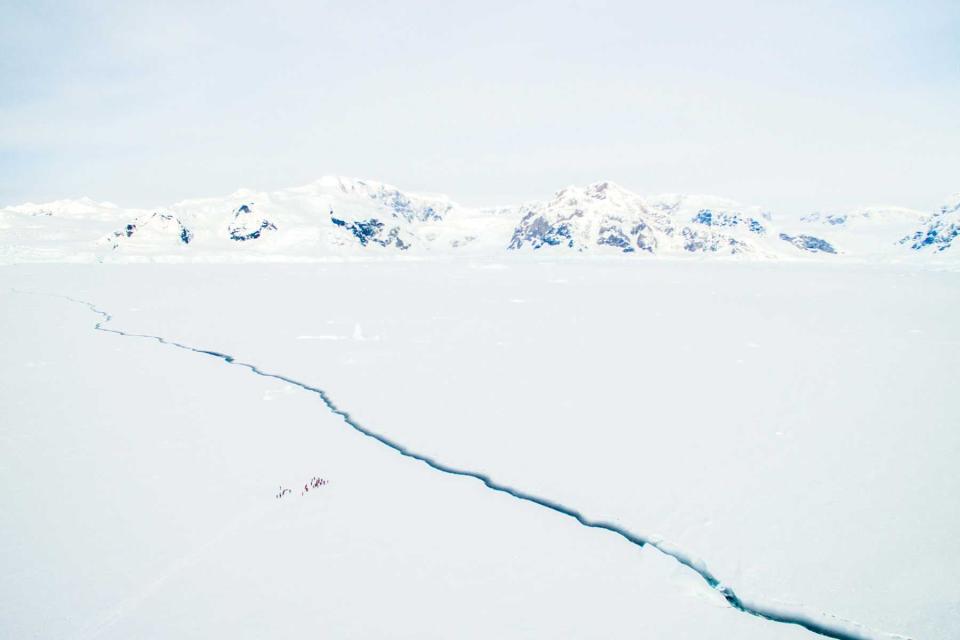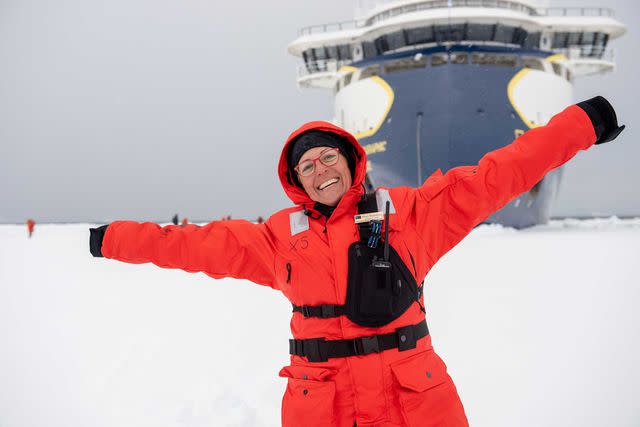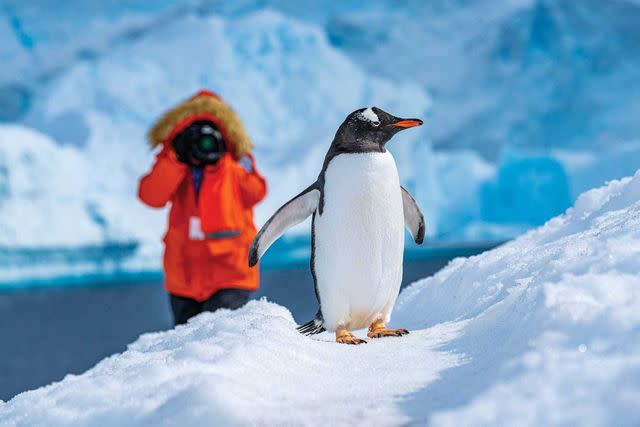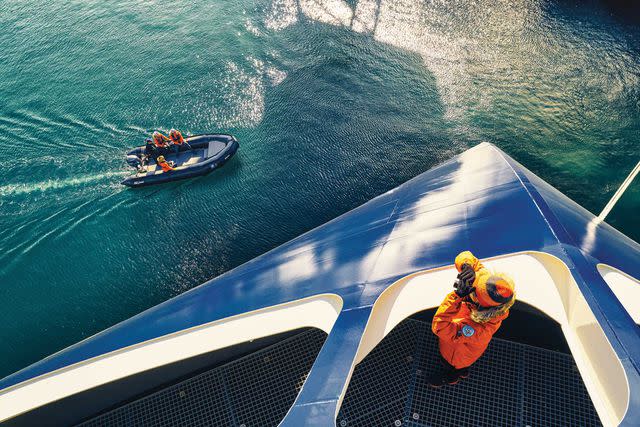Leading Expeditions in Antarctica Was Considered a Man's Job for Far Too Long — Meet the Women Who Are Changing That
- Oops!Something went wrong.Please try again later.
"When I started in this business, the only female expedition leader was a co-leader with her husband. Women were seen as cruise directors, but not expedition leaders."

"In the minds of many, Antarctica still is one of the last macho redoubts, where men are men and women are superfluous," wrote Michael Satchell in The San Bernardino Sun in a 1983 article. He would go on to quote Dr. Lyle McGinnis, a geologist who frequented Antarctica, who said, "Women create difficulties and problems, and I'm not sure it's worth having them along."
Since humankind first discovered Antarctica some 200 years ago, women have fought to earn equal footing with men on the continent — quite literally. The first two women to land on the continent, Caroline Mikkelsen on an island in 1935 and Ingrid Christensen on the mainland in 1937, did so more than a century after the first man, John Davis, in 1821.
It wasn't for lack of interest. Women had applied to join the crews of the great explorers of the Heroic Age of Antarctic Exploration, which included the likes of Sir Ernest Shackleton, with no success. In the second half of the 20th century, women began joining expeditions and scientific missions, to the disdain of men like McGinnis. They were still largely discriminated against, even being called "powderpuff explorers."
So, imagine my delight when on my first trip to Antarctica in December 2021 — aboard Lindblad Expedition's National Geographic Endurance, named after Shackleton's ship, no less — I had a female expedition leader.

Sheri Bluestein, an Antarctic veteran with 14 seasons under her belt, both working on land at research bases and as a guide on expedition ships, navigated extremely difficult weather conditions on our sailing. She worked closely with Captain Aaron Wood to find us safe harbor to make landings. And she juggled those duties while not only keeping guests informed, entertained, and safe, but managing her team of expedition staff, which included five women.
"Sheri is the first female expedition leader I've ever worked with in Antarctica," Maya Santangelo, an undersea specialist, told guests during a lecture on board.
Though expedition cruising has been offered in Antarctica since the mid-1960s — Lindblad was the first dedicated operator to bring guests to the Southern Ocean — the industry was male-dominated for decades.
"Let me start with something that I heard from a captain many years ago, when I was leading an expedition to Antarctica: 'If I wanted a woman to tell me what to do, I would have stayed at home,'" says Suzana Machado D'Oliveira, an Abercrombie & Kent expedition director who began guiding with the company in 1991. She currently serves as the tour company's representative to the International Association of Antarctic Tour Operators (IAATO), the industry's governing body. "When I started in this business, the only female expedition leader was a co-leader with her husband. Women were seen as cruise directors, but not expedition leaders."
Fortunately, the tides are turning. Many industry workers I spoke with say they now see a more equal number of male- and female-identifying expedition staff. (It's, unfortunately, not easy to pinpoint the exact number of guides working in Antarctica in any given year, because guides are hired by individual cruise lines rather than the IAATO, and some guides work on different ships in the same season.)
"It's such a pleasure to see that the ratio of men to women on expedition teams is now very often 50-50," says Florence Kuyper, an expedition leader who first traveled to Antarctica in 2004 and currently guides for Aurora Expeditions. "It's not always easy, but I'm always so happy and proud when male colleagues defend the gender case for women in expeditions, and when my incredibly capable female colleagues ignore gender perceptions and stereotypes and perform naturally and with their incredible expertise."

While women are far more likely to be hired by expedition companies today, stereotyping and prejudice still — perhaps unsurprisingly — exist in the industry.
Some of that comes from the general questions most professional women hear at some point in their careers: "Are you married?" and "When are you going to have children?" Contracts for expedition staff typically last weeks, if not months, making it difficult — but not impossible — to grow relationships and potentially a family. In talking to these expedition leaders, I've learned that, stereotypically, this seems to be more of a perceived issue for women than it does for men.
Even as a guest, I had fellow passengers question why I traveled to Antarctica without my husband. "Pourquoi pas?" I'd reply cheekily, referring to the French explorer Jean-Baptiste Charcot, whose Antarctic expedition ship bore that name. (It means "why not?" in French.)
The extreme conditions of Antarctica even make some guests question the athletic capabilities of women.
"I've heard so many times from guests when they get into my Zodiac, or into any female's Zodiac, 'Oh, do you know how to drive this thing? When did you get your license?'" says one female expedition leader, who spoke on condition of anonymity. "I was on a trip once, and a bunch of female staff mentioned that at dinner. The male staff? Their jaws hit the floor. But all of the women in the room said, 'Yep, I've had that said to me.'"
Dr. Hanne Nielsen, a lecturer in Antarctic Law and Governance at the University of Tasmania in Australia, notes this isn't altogether uncommon on expeditions. "As a woman, there is an aspect of having to prove yourself, and to perform tasks such as driving Zodiacs at least as well as male colleagues. My female expedition leaders have all been super impressive, with more certificates and experience than male peers in many instances," she says.
Nielsen, who spent five seasons guiding in the Southern Ocean, has co-authored several papers regarding sexism in Antarctica. "When it comes to perceptions of Antarctica, images of the Heroic Era figure battling the blizzard still dominate," she says. "The gendered history of the continent plays a role here, because Antarctica is often figured as a place for (masculine) bodies to pit themselves against the superlatives of the landscape: coldest, windiest, et cetera."

Conversely, some female expedition leaders, including Geraldine "JD" Massyn of Abercrombie & Kent, find the "feminine" lack of machismo to be a beneficial thing on an expedition staff, particularly regarding safety. "Many male expedition leaders prefer female Zodiac drivers on their teams, since the 'girls' would say 'I do not feel safe driving in these conditions,' versus a 'macho' attitude from the male drivers, who would never admit they were afraid to drive in adverse weather conditions," she says.
Massyn, a former lawyer who left the profession for the sea, worked her way up from shopkeeper to expedition leader over 30 years, and she feels that the industry has "naturally evolved to incorporate gender equality."
She continues, "The world of expedition cruising involves good days and bad, achievement and disappointment, even moments of danger. We trust one another with our lives, each of us, male and female working together with the captain and the crew to achieve the same goal."
While working in a far-flung place and learning to depend on other guides may encourage teamwork, it can also pose greater challenges for women who encounter sexism or harassment at work. "I think that the hierarchies on ships and the associated power imbalances can reinforce gender stereotypes and create an environment that is more conducive to harassment," Nielsen says. "When you're in a remote location, living and working on a relatively small ship, it can be challenging to report things when they do happen."
Nielsen acknowledges that in some cases, reporting harassment could result in the loss of job prospects for that person, even if they were the victim, not the perpetrator. "To complain is to become the location of the problem," she says. (Sexual assault on cruise ships is a well-documented problem.)
Despite these extreme challenges, most female expedition leaders feel that persevering is worth it, and they're hopeful that industry-wide change will continue. Ultimately, women in Antarctica share a deep sense of pride, not only to be doing what they love, but also to be able to share their passion and excitement with others.
"We see older adults suddenly become children sledding on their backsides and giggling like they're little kids, and it's so joyful. And you can't be sad when you're watching penguins. It's impossible!" Bluestein tells me during our voyage, describing how grateful she is to bring such happiness to others. "What a great job I have. I'm very lucky."
For more Travel & Leisure news, make sure to sign up for our newsletter!
Read the original article on Travel & Leisure.

